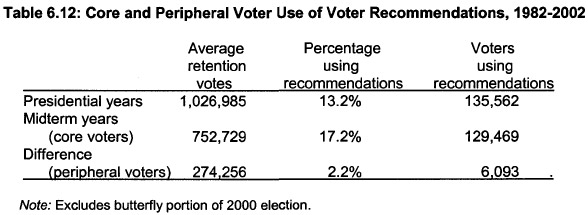
One of the fun details in Albert Klumpp's study of Cook County judicial elections—which I wrote about at some length in my previous post—is his exploration of a familiar belief: in Cook County, an Irish surname is a massive electoral advantage. It's something I've always been a bit skeptical of; the city's clearly not post-racial, but I figured at this point it would be post-Irish.
Klumpp's finding? It is, basically. Here's how he approached it:
Coding a name-reaction variable such as "Irishness" is by nature subjective, so a balance between thoroughness and efficiency was necessary. A list of the judges' names was first coded by two UlC professors, one a historian and the other a political scientist. Where both professors agreed, the variable was coded 1 for Irish or 0 for other. The few instances of disagreement were further researched by the author using Irish cultural and genealogical Web sites. Several names that could be interpreted as Irish but also as English or Scottish were coded with a middle value of 0.5. The 0.5 level was also coded when a judge's middle or maiden name was Irish but not his or her surname, or vice versa. The end result was a trichotomous variable. Of the judges in the 1982-2002 period, 27% were coded with a full or partial Irish name.
The results? Having an Irish name is an advantage, but a small one:
while being a woman or having an Irish name does turn out to be beneficial, the value of that benefit is small—only around 2.0 points for a woman and 1.5 points for an Irish name.
(Yes, being female correlates with a statistically significant but practically small advantage. As a side note, this is pretty interesting: "from 1982 through 1996 an average of only 3.5 female judges appeared on each ballot, but the numbers exploded thereafter, with 26 in 1998, 21 in 2000, and 24 in 2002. Theoretically, having more women on the bench may result in higher retention rates.)
Actually being a good judge, or at least good enough to avoid the wrath of lawyers and newspapers, has a bigger effect than gender or Irishness:
The results indicate that over the eleven-election period, a negative Tribune recommendation resulted in a 5.7 percentage point decrease in approval rate, a negative Sun-Times recommendation resulted in a 3.2 point decrease, and negatives from the Chicago Bar Association and Chicago Council of Lawyers resulted in decreases of 4.5 points and 2.9 points, respectively.
But it's still not that much of an effect, barely enough to get a judge off the bench under even extreme circumstances. Of all the 540 retention elections Klumpp looked at, the most at-risk judge he found was Lawrence Passarella, whose sin was mighty. Imagine the Anthony Abbate case, only Abbate isn't a cop but just some guy, and the woman he drunkenly beat up was herself a cop. Passarella let him walk, on the assailant's contention that a mysterious tattooed stranger had slipped him a mickey just before he was pulled over by the cop for driving the wrong way down a one-way street.
The FOP estimated it could get 50,000 votes against Passarella. Richard M. Daley, then a state's attorney, and CPD chief Fred Rice attacked Passarella. Royko hung fire on the judge. And he did get recalled, but a majority of voters still voted to retain him. As Eric Zorn notes, Passarella was a mere three percentage points away from keeping his job.
The biggest advantage for incompetent judges? Presidential elections. Every four years brings a flood of "peripheral" voters, who may be perfectly well-versed in presidential politics but are, for the purposes of judicial elections, low-information voters, who don't follow the recommendations:
The regression results indicate that the approval percentage of a judge who receives four negative recommendations out of four is lowered by 17.2 percentage points in a midterm election and 13.2 percentage points in a presidential election. Applying these percentages to the average numbers of retention votes cast in midterm and presidential elections across the 1982-2002 period, as shown in Table 6.12, reveals that the use of recommendations by peripheral voters is virtually nonexistent. Of course, the numbers cited in the table should be viewed only as approximations, since the number of elections covered is small. Nevertheless, the magnitude of the difference between the core and peripheral groups is remarkable.
The raw numbers are stark; even Passarella might have been able to keep his job if the campaign against him hadn't been during a midterm election:

Which brings us back to this year's judicial election, and the retention of Cynthia Brim. It shouldn't be that surprising, because it's much harder to recall a judge during a presidential election. Irishness, gender, competence: all bow down to the might of inertia.
Photograph: Chris Breeze (CC by 2.0)



